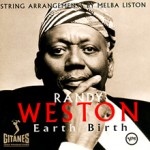©Laurence Svirchev
 Romance, beauty, and love are qualities not commonly extolled in contemporary art. Randy Weston takes a different course, however, and visits these very virtues in Earth Birth. The compositions date from Weston’s 1950’s repertoire when his writing (and playing with trombonist Melba Liston) concentrated on waltzes, some of them for children. This return to music written four decades ago is rendered singularly romantic by the optic of time and Liston’s arrangements for the 25 strings of the Montréal Jazz Festival Orchestra. Bassist Christian McBride and drummer Billy Higgins are marvelously understated, felt more than heard.
Romance, beauty, and love are qualities not commonly extolled in contemporary art. Randy Weston takes a different course, however, and visits these very virtues in Earth Birth. The compositions date from Weston’s 1950’s repertoire when his writing (and playing with trombonist Melba Liston) concentrated on waltzes, some of them for children. This return to music written four decades ago is rendered singularly romantic by the optic of time and Liston’s arrangements for the 25 strings of the Montréal Jazz Festival Orchestra. Bassist Christian McBride and drummer Billy Higgins are marvelously understated, felt more than heard.
The first cut, “Earth Birth”, opens with a Weston signature crescendo on the bass end of the piano. When the last reverberations settle, Weston plays the melody with strings acting as a counterpoint. If the crescendo marks the tremors of birth, then consequent melody, counterpoint, and improvisation mark the first drawing of breath.
The second composition, “Pam’s Waltz”, was written in 1950 for his new daughter. Now a beautiful woman with a stride almost as long her Daddy’s, “Pam’s Waltz” is an elegant dance. Weston stays very much in the middle register of the piano (unlike his usual attack: his reach and tremendous hands frequently emphasize the bottom and top ends of the keyboard). And each time he states the melody the strings play evocatively consonant long chords.
Collaborations of jazz musicians with string sections tend to get rather corny, but that is definitely not the case here. On “Berkshire Blues”, the violins and violas provide rhythmic propulsion to the piece, and the cellos provide an easement from that propulsion. When the strings drop out of the playing, they are still felt by absence. This was a real musical collaboration, not a series of tack-on arrangements. The liner notes even name the string players, a credit rarely accorded in the classical world.
It is tempting to say that the 70 year old Weston is taking a wistful look at the compositions of his youth. Maybe, but not completely true. Since 1989, when he recorded the stunning Portraits Series (Monk, Ellington, Self-), Weston has demonstrated that he is the Hercules and principle definer of contemporary African-American Jazz. With Earth Birth, Weston has added one more star to the bright constellation of his musical career.
Originally appeared in 5/4 Magazine, Seattle, 1997.